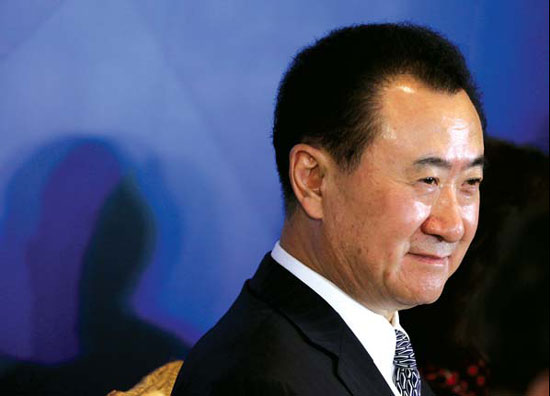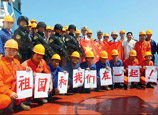
 |
| Wang Jianlin, chairman of Wanda Group. [Photo provided to China Daily] |
The first steps into the cultural industry, as Wang Jianlin recalled in an interview with Forbes Magazine earlier this year, were made by force of circumstance. At first, Wanda cooperated with Time Warner to build theaters, but a regulation released in late 2005 restricted foreign ownership of shares in theaters to less than 49 percent for each venture, which led to Time Warner's withdrawal from its theater business on the Chinese mainland. Then Wanda worked with Shanghai Media Group, but subsequent personnel changes at SMG saw that cooperation end. That was when Wanda decided to operate its own theaters and other cultural facilities, such as karaoke and theme parks.
Wanda's proceeds during those seven years have proved that the cultural industry creates big value. When Wanda entered the film industry in 2005, total box office revenue in China was only around 800 million yuan, but in 2011, that figure rose to 13 billion yuan nationwide and by November this year, the number had grown to 14.3 billion yuan. Wanda Cinema Line, which has 1,000 screens in China, holds market share of 15 percent.
The cultural sector will become a "pillar" of the group, said Wang during his speech in December. The government has also identified the cultural sector as one of the pillars of Chinese industry; at a meeting in 2011, the Party's central leadership defined culture as a pillar industry and a growth business in the nation's 12th Five-Year Plan (2011-15), and expects it to account for 5 percent of national GDP by 2016.
Polishing company image
"Wanda has played a brilliant card with culture," said Chen Hu, a cultural industry analyst at Dongxing Securities. "The move not only helped to change Wanda's image from that of just a property developer into one of a cultural products maker, but also echoes the nation's craving for soft power and global exposure."
















 Black-headed gulls come to Kunming for winter
Black-headed gulls come to Kunming for winter


![]()
